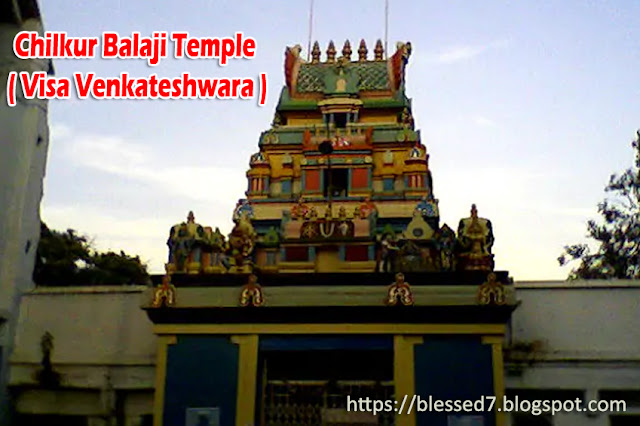

Showing posts with label kaliyuga. Show all posts
Showing posts with label kaliyuga. Show all posts
Tuesday, May 27, 2008
Srivaishnavism - Srivaishnavism is a philosophy and a religion based on the Upanisads and the divine hymns of Alwars

Labels:
bhakti,
cosmology,
dharma,
eshwara,
God,
kaliyuga,
karmas,
mathematical,
meditation,
Moksha,
narayana,
paramapada,
physics,
satyayuga,
slokas,
Srivaishnavism,
theory,
vaishnava,
values,
Vedic
Friday, May 02, 2008
Chilkur Balaji Temple (Visa Venkateshwara)
ABOUT THE TEMPLE
The Balaji Temple is located at Chilkur in the Hyderabad district. It is 33 Kms away from Mehedipatnam. Approximately 75,000 to 1,00,000 devotees visit in a week. Generally temple gets heavy rush on Fridays and Sundays.
The temple at Chilkur is managed by the hereditary trustee Sri M.V. Soundara Rajan and Sri C.S. Gopala Krishna. The entire family of the archaka, including the women are dedicated themselves to serve the God.
HISTORY
Twenty Five kilometers from Hyderabad off the Vikarabad road and on the banks of Osmansagar is the picturesque village of Chikur with its hoary temple dedicated to Sri Balaji Venkateshwara. From the style, structure and appearance, it can be inferred that the temple was built half a millennium ago. Set in sylvan surroundings, the temple attracts thousands of pilgrims every year and is an ideal place for sequestered retreat and meditation. It enjoyed in the past, great days of pomp and glory.
The temple is one of the oldest in Telengana, having been built during the time of Akkanna and Madanna, the uncles of Bhakta Ramdas. According to tradition, a devotee who used to visit Tirupati every year could not do so on one occasion owing to serious ill-health. Lord Venkateshwara appeared in his dream and said, "I am right here in the jungle nearby. You don't have to worry." The devotee at once moved to the place indicated by the Lord in the dream and saw a mole- hill there, which he dug up. Accidentally, the axe struck Lord Balaji's idol covered by the mole-hill below the chin and on the chest, and surprisingly blood started flowing profusely from the "wounds", flooding the ground and turning it scarlet. The devotee could not believe his eyes when he saw this. Suddenly he could not believe his ears also when he heard a voice from the air which said,"Flood the mole-hill with cow's milk". When the devotee did so, a Swayambhu idol of Lord Balaji accompanied by Sridevi and Bhoodevi(a rare combination) was found, and this idol was installed with the due rites and a temple built for it.
Sri Balaji venkateshwara, the Pratyaksha Daiva in kaliyuga, is thus available at Chilkur to shower blessings on His devotees who for any reason are unable to go to Tirupati. Many devout worshippers flock to the temple, to receive the blessings of the Lord and his consorts throughout the year particularly during the Poolangi, Annakota and Brahmothsavams
With the earnest desire to revive the former glory and importance of the temple, the idol of Ammavaru was installed in 1963 the year following the Chinese aggression, and when the aggression was unilaterally vacated, Ammavaru was given the name of Rajya Lakshmi, signifying this welcome event. The unique feature of this idol is that lotus flowers are held in three hands and the fourth hand is in such a position towards the lotus feet which signifies the doctrine of Saranagathi.
The temple has been visited by great Acharyas from time to time. A visit to the temple is a must for the Jeer of Sri Ahobila Mutt every time he visits the twin cities, and in the temple is installed the idol of the first Jeer. The Tilakayaths of Sri Vallabhacharya Sampradaya have been regularly visiting the shrine. Jagadguru Sri Sankaracharya of Sringeri Mutt and his disciple graced the efforts of the trustees in improving the temple.
REMEDIES
Vishnu Sahasranama was first composed & recited by Bhishma, when he was on his deathbed. Lord Krishna went to see Bhishma because he was breathing his last. When Bhishma had darshan of Lord Krishna, he started reciting Vishnu Sahasranama immediately. Vishnu Sahasranama means, rosary of thousand names of Lord Vishnu.
He started reciting Vishnu Sahasranama in the order he saw lord's form continuously and successively.
Vishnu Sahasranama is found in Mahabharata, the great epic of India.
If confers all the mundane transcendental benefits to the person who chants it. There are so many Sahasranamas of Vishnu, but among them this happens to be the most cardinal and important one because right from Sankaracharyalu there are so many Sages and Saints who have recited and commented in their own way. Even today, it is recited with the fervor and gaiety in all the temples of Lord Vishnu.










